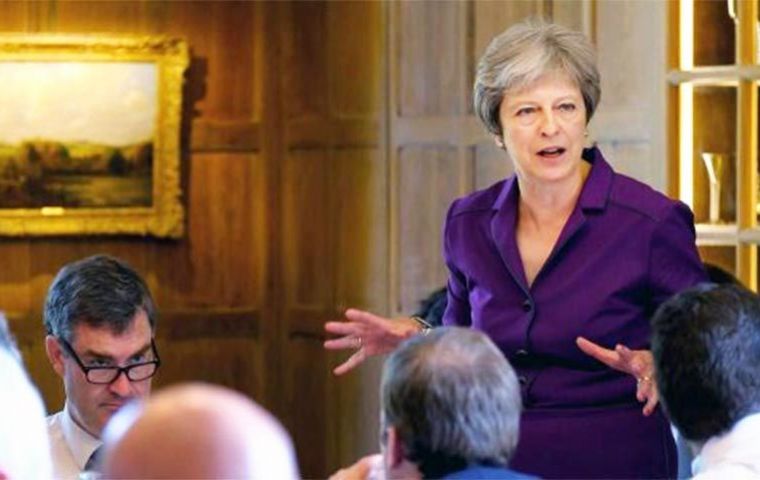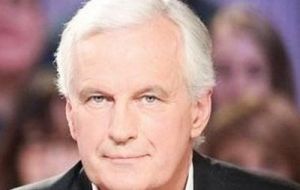MercoPress. South Atlantic News Agency
May announces cabinet has reached a “collective agreement” on post Brexit
 Mrs. May has “picked a side” by opting for a closer relationship with the EU than any colleagues desired, and now has to sell it to her party and European leaders (Pic Joel Rouse/Crown Copyright/PA)
Mrs. May has “picked a side” by opting for a closer relationship with the EU than any colleagues desired, and now has to sell it to her party and European leaders (Pic Joel Rouse/Crown Copyright/PA)  “This is a proposal that I believe will be good for the UK and good for the EU, and I look forward to it being received positively,” Mrs. May told the BBC.
“This is a proposal that I believe will be good for the UK and good for the EU, and I look forward to it being received positively,” Mrs. May told the BBC.  The EU's negotiator Michel Barnier, who earlier suggested the EU would be willing to shift its position if the UK relaxed some of its “red lines”, tweeted his reaction.
The EU's negotiator Michel Barnier, who earlier suggested the EU would be willing to shift its position if the UK relaxed some of its “red lines”, tweeted his reaction. The cabinet has reached a “collective” agreement on the basis of the UK's future relationship with the EU after Brexit, Theresa May has said. Ministers have signed up to a plan to create a free trade area for industrial and agricultural goods with the bloc, based on a “common rule book”.
They also supported what could amount to a “combined customs territory”. The plan agreed after a 12-hour meeting, is expected would “anger many Tory Brexiteers”.
The prime minister had “picked a side” by opting for a closer relationship with the EU than many colleagues desired - and she now had to sell it to her party and the other European leaders.
No 10, she added, hoped the new commitments would unlock the next phase of talks with the rest of the EU but it was not yet clear how many, or what kind, of objections were raised.
Downing Street said the proposals marked a “substantial evolution” in the UK's position and would resolve outstanding concerns about the future of the border between Northern Ireland and the Irish Republic.
“This is a proposal that I believe will be good for the UK and good for the EU, and I look forward to it being received positively,” Mrs. May told the BBC.
One pro-Brexit cabinet minister told the BBC there was “no point” pushing for a vote as “we were well and truly outnumbered by 20 to seven”.
Nicholas Watt, political editor of BBC Newsnight, said the minister also warned that “it will be a problem” if there is any attempt to “water down plans even further” should the EU reject the UK's proposals.
The UK said it now wanted to accelerate the negotiations in an effort to secure an agreement by October, but also warned it will step up preparations for leaving on 29 March 2019 without a deal.
The EU's negotiator Michel Barnier, who earlier suggested the EU would be willing to shift its position if the UK relaxed some of its “red lines”, tweeted his reaction:
#Chequers discussion on future to be welcomed. I look forward to White Paper. We will assess proposals to see if they are workable & realistic in view of #EUCO guidelines. Next negotiations w/ #UK on WP, & Withdrawal Agreement, w/c 16 July #Brexit
The prime minister had gathered her 26 cabinet ministers together at her country residence to try and resolve differences over the shape of the UK's relations with the EU and break the current deadlock with the EU.
The main details of the “Chequers statement” are as follows:
- The UK would accept continuing “harmonization” with EU rules on the trade in goods, covering only those necessary to ensure frictionless trade
- Parliament would have the final say over how these rules are incorporated into UK law, retaining the right to refuse to do so
- There will be different arrangements for trade in services, including financial products, with greater “regulatory flexibility” and “strong reciprocal arrangements”
- Freedom of movement as it stands will come to an end but a “mobility framework” will ensure UK and EU citizens can continue to travel to each other's territories and apply for study and work
- A new customs arrangement will be phased in, with the goal of “a combined customs territory”
- The UK will be able to control its own tariffs and develop an independent trade policy
- The jurisdiction of the European Court of Justice will end but the UK will pay regard to its decisions in areas where common rules were in force.
Mrs. May said this was an “important step” in the process of negotiating the UK's smooth exit from the EU.
“Of course we still have work to do with the EU in ensuring that we get to that end point in October. But this is good we have come today, following our detailed discussions, to a positive future for the UK,” she said.
She said the proposals, to be formally published in a white paper next week, would give the UK the freedom to strike trade deals with other countries while maintaining regulatory, environmental and consumer standards.




Top Comments
Disclaimer & comment rules-

-

-

Read all commentsThe question is why is this piece appearing in Mercopenguin, a British government propaganda organ supposedly devoted to America, South America and the “South Atlantic”?
Jul 14th, 2018 - 12:53 am 0That's nice, but why didn't they do this a year ago?
Jul 07th, 2018 - 12:33 pm -1@PE
It's not a secret, we never wanted to be part of a 'United States of Europe'. Joining the EU was always a compromise, and that is also true of other countries. Didn't Italians just vote for a party that wants to ditch the Euro?
Now all that remains is for the EU to reject the British proposal. :-)
Jul 07th, 2018 - 01:55 pm -1Commenting for this story is now closed.
If you have a Facebook account, become a fan and comment on our Facebook Page!